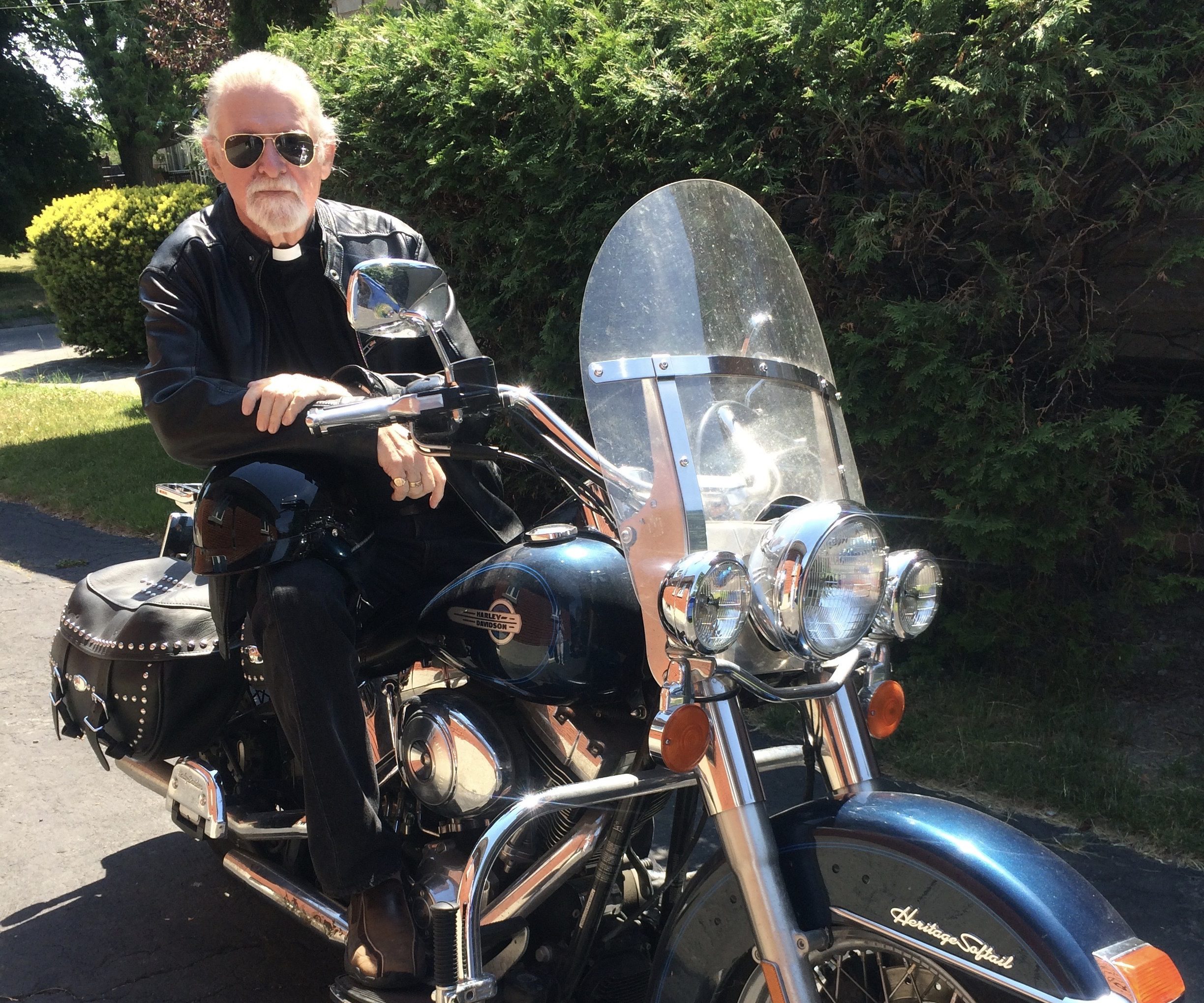Rev. James Christie is a Winnipeg-based minister, scholar, ecumenist, essayist, occasional Broadview contributor and religious diplomat. He’s also been an avid motorcycle rider since 1968, and for the last six years has combined two of his passions as the chaplain for a motorcycle club. Kate Spencer spoke to him about how those worlds come together.
KS: Tell us what it’s like to be in a motorcycle club.
You may unsubscribe from any of our newsletters at any time.
JC: Very often motorcycle clubs are purely recreational—a group of friends will get together on a weekend and just ride, as far as they can and as much as they wish to. The one I ride with, The Widows Sons, is an international club. It is an offshoot of the Masonic fraternity and has its own structures and governance, and rides under the general slogan of Brothers without Borders. A lot of the work that clubs do is charitable—our group supports an annual breast cancer ride, and we partner with an autism association and raise money with them each year.
KS: What’s the role of a chaplain in a motorcycle club?
JC: It’s common for a motorcycle club with no religious connotations to have a chaplain only when they find one. The only other [motorcycle chaplain] I know of is in Missouri. He also happens to be clergy, but that is not necessarily regulation. It could be someone who just has strong religious feelings and is willing to do the work.
The chaplain of a motorcycle club is likely to be called upon to celebrate a wedding of its members. Perhaps to take a funeral liturgy. There are certain other liturgical roles—one is a tradition called the Blessing of the Bikes. It generally takes place at the beginning of a ride, usually an extensive ride, of the club. I’ve written a liturgy for it, I don’t know of anyone else who has written a formal one. A totally unique liturgical act in our club would be the Liturgy of Admission to the Order of the Phoenix. A number of us have been involved in accidents and managed to get up and limp, if not walk away, and ride again, as a phoenix from the ashes.
More on Broadview: What it’s like to be a hospital chaplain during COVID-19
KS: What’s different about being a chaplain in a motorcycle club?
JC: It’s important to have creds as a chaplain in the motorcycle community, to be someone who has ridden for a long time with a community of riders. My club does an annual ride that begins Friday morning and returns Sunday, about 1,600 km. And that’s a tough ride in a lot of places. You’re constantly pummelled by rain, and sometimes black flies and midges. The camaraderie is huge, probably more akin to a military chaplain than a hospital one. The care for one another, as well as other motorists, is extreme. You’re both an individual and also a member, in the truest sense, of the group. The capacity to relate is perhaps more heightened in the context of a motorcycle club than it is almost anywhere else I’ve experienced. I would guess it’s something to do with the ambivalent way people have come to look at most motorcyclists.
KS: Why would a motorcycle club decide they need someone in the role of chaplain?
JC: I think part of it is that most of these folks aren’t church people. But there is still this sense that they would be more in tune with the reality of the universe, if you like, if they had someone whose responsibility in the community was to at least listen and understand when they had spiritual needs to express. When you ride a motorcycle, at least for the time you’re on the machine, you’re living at least a little on the edge. The idea of having someone there to attend to spiritual needs, but not necessarily denominational needs, would be pretty important.
KS: What does ministry look like in that context?
JC: It’s a ministry of presence, sometimes of ritual. But almost always of being one with the community. There is a certain expertise on a motorcycle that’s required to be taken seriously. A chaplain in a hospital has the appropriate training, but they don’t have to be able to handle 900 pounds of steel, rubber, and fuel at 120 km/hr for hours on end.
All Christians, by virtue of their baptism, and certainly all clergy, are meant to be ambassadors for Christ. I push that further—I would consider myself absolutely a Christian, but almost all my work for the last decade has been involved in inter-religious dialogue and conversation. I would almost say I’m an ambassador for the faith perspective. I think that’s something we’re called to be wherever we are, including in the midst of a motorcycle ride.
This interview has been edited for length and clarity.
***
Kate Spencer is a writer in Cobourg, Ont.
I hope you found this Broadview article engaging. The magazine and its forerunners have been publishing continuously since 1829. We face a crisis today like no other in our 191-year history and we need your help. Would you consider a one-time gift to see us through this emergency?
We’re working hard to keep producing the print and digital versions of Broadview. We’ve adjusted our editorial plans to focus on coverage of the social, ethical and spiritual elements of the pandemic. But we can only deliver Broadview’s award-winning journalism if we can pay our bills. A single tax-receiptable gift right now is literally a lifeline.
Things will get better — we’ve overcome adversity before. But until then, we really need your help. No matter how large or small, I’m extremely grateful for your support.
Jocelyn Bell
Editor/Publisher















Thank you for helping me understand a little bit what is to be a chaplain I didn’t answer this this was put on me but I’m going to try to give it my best